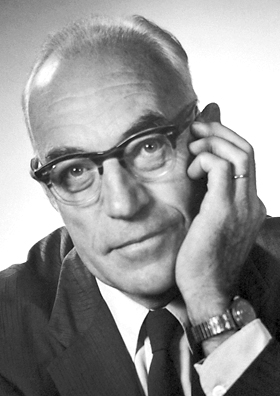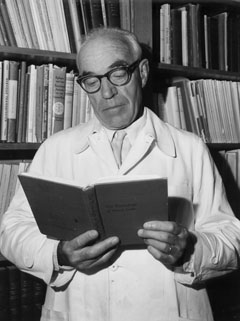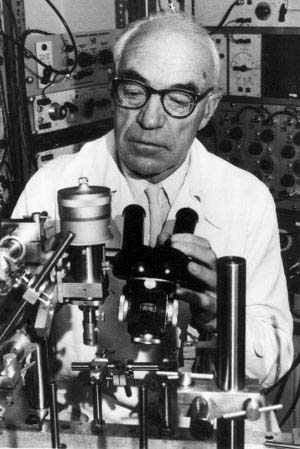<Back to Index>
- Neurophysiologist John Carew Eccles, 1903
- Painter Jozef Israëls, 1824
- Admiral of the United States Navy Hyman George Rickover, 1900
PAGE SPONSOR



Sir John Carew Eccles, AC FRS FRACP FRSNZ FAAS (27 January 1903 – 2 May 1997) was an Australian neuro - physiologist who won the 1963 Nobel Prize in Physiology or Medicine for his work on the synapse. He shared the prize with Andrew Fielding Huxley and Alan Lloyd Hodgkin.
Eccles was born in Melbourne, Australia. He grew up there with his two sisters and his parents: William and Mary Carew Eccles (both teachers, who home schooled him until he was 12). He initially attended Warrnambool College, (where a science wing is named in his honour), then completed his final year of schooling at Melbourne High School. Aged 17, he was awarded a senior scholarship to study medicine at Melbourne University. As a medical undergraduate, he was never able to find a satisfactory explanation for the interaction of mind and body; he started to think about becoming a neuroscientist. He graduated (with first class honours) in 1925, and was awarded a Rhodes Scholarship to study under Charles Scott Sherrington at Magdalen College, Oxford University, where he received his Doctor of Philosophy in 1929.
In 1937 Eccles returned to Australia, where he worked on military research during World War II. After the war, he became a professor at the University of Otago in New Zealand. From 1952 to 1962 he worked as a professor at the Australian National University.
In the early 1950s, Eccles and his colleagues performed the research that would win Eccles the Nobel Prize. To study synapses in the peripheral nervous system, Eccles and colleagues used the stretch reflex as a model. This reflex is easily studied because it consists of only two neurons: a sensory neuron (the muscle spindle fiber) and the motor neuron. The sensory neuron synapses onto the motor neuron in the spinal cord. When Eccles passed a current into the sensory neuron in the quadriceps, the motor neuron innervating the quadriceps produced a small excitatory postsynaptic potential (EPSP). When he passed the same current through the hamstring, the opposing muscle to the quadriceps, he saw an inhibitory postsynaptic potential (IPSP) in the quadriceps motor neuron. Although a single EPSP was not enough to fire an action potential in the motor neuron, the sum of several EPSPs from multiple sensory neurons synapsing onto the motor neuron could cause the motor neuron to fire, thus contracting the quadriceps. On the other hand, IPSPs could subtract from this sum of EPSPs, preventing the motor neuron from firing.
Apart from these seminal experiments, Eccles was key to a number of important developments in neuroscience. Until around 1949, Eccles believed that synaptic transmission was primarily electrical rather than chemical. Although he was wrong in this hypothesis, his arguments led him and others to perform some of the experiments which proved chemical synaptic transmission. Bernard Katz and Eccles worked together on some of the experiments which elucidated the role of acetylcholine as a neurotransmitter.
He was appointed a Knight Bachelor in 1958 in recognition of services to physiological research. He won the Australian of the Year Award in 1963, the same year he won the Nobel Prize.
In 1964 he became an honorary member to the American Philosophical Society, and in 1966 he moved to the United States to work at the Institute for Biomedical Research in Chicago. Unhappy with the working conditions there, he left to become a professor at the University at Buffalo from 1968 until he retired in 1975. After retirement, he moved to Switzerland and wrote on the mind - body problem.
In 1990 he was appointed a Companion of the Order of Australia (AC) in recognition of service to science, particularly in the field of neurophysiology. He died in 1997 in Locarno, Switzerland.
Eccles was a devout theist and a sometime Roman Catholic, and is regarded by many Christians as an exemplar of the successful melding of a life of science with one of faith. A biography states that, "although not always a practicing Catholic, Eccles was a theist and a spiritual person, and he believed 'that there is a Divine Providence operating over and above the materialistic happenings of biological evolution'..."